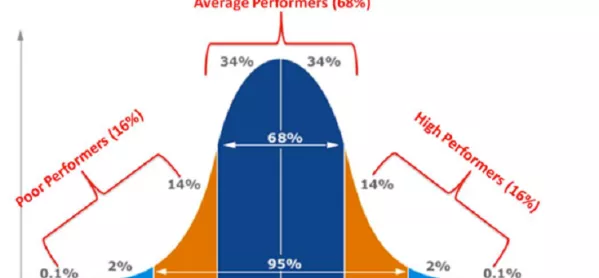‘Dear Nicky: A quick lesson in statistics’

Dear Nicky,
I’ve just read this. In there it says this:
“Schools eligible for intervention will be those which fall below a new ‘coasting’ level for 3 years. In 2014 and 2015 that level will be set at 60 per cent of pupils achieving 5 good GCSEs or an above-average proportion of pupils making acceptable progress.”
I am now worried that you haven’t been briefed about the word “average” or the new (laudable) determination by Ofqual to ensure GCSE grade inflation is halted. The thing is this: by definition there are only a limited number of places on the bell-curve that can be called “good GCSEs”. You’ve decided to give a pejorative label (implicitly “bad GCSEs”) to about 50 per cent of all grades. Now, instead of Grades 1-4 at GCSE representing any sort of achievement, they’ve been killed stone dead. Nice work. That didn’t take you long.
I have many students who by definition are unlikely to get “good GCSEs” given their starting point. Don’t get me wrong; we’re slogging our guts out here, but the thing is this: by definition, it’s a zero sum game. More or less. We can only get more grade 5s and above if, on average, other students somewhere get fewer. This is how things work now.
You may know about the reference tests being introduced to track progress between cohorts but realistically we’d only expect a slow incremental change year on year. That’s how standards are maintained. For this to be fair, it is imperative that grades 1-4 actually matter. However, rather than accepting this (understanding it?) you’ve decided that only the top grades count. You appear not to appreciate - or care - that, by definition, not everyone can get them. Do you want Glenys Stacey’s number? I suggest you give her a call. This isn’t some kind of “enemy of promise” excuse-making thing; it’s a hard-wired technicality derived from grade-setting across the examination system. You get that, right?
Once you aggregate up to whole-school data, it is then obvious that not every school can have “an above-average proportion of students making acceptable progress” and/or above 60 per cent of students with five good GCSEs. Why? Because, by definition of “average” and the laws of the bell-curve, that isn’t statistically likely, especially given the link between progress and attainment. It’s the Matthew effect - check the stats.
The “intervention” concept implies that by the voodoo of academisation you will eliminate schools that are both below average for attainment and not above average for progress. Let me explain. As long as we’re holding standards to the bell curve to break the inflationary cycle, you’re on a hiding to nothing. Actually, that’s we are on a hiding to nothing. You’ll be fine! You’ll “transform” some schools (regression to the mean will see to that) but only if other schools take their place. Do the Maths.
I know that “tough talk” is all the rage down at the DfE, but you are the secretary of state, not the editor of the Daily Mail. You do realise that we’re reasonably intelligent folk and we expect certain standards. Do you really want some of my students to be told that GCSE grades that might have mattered to them are “bad GCSEs”? Do you realise how ludicrous it is to batter schools for not meeting certain standards when not everyone can reach them by definition? Do you ?
Seriously. This isn’t good enough.
Yours,
Tom
This article was originally posted on Tom Sherrington’s personal blog, which you can read here.
Keep reading for just £1 per month
You've reached your limit of free articles this month. Subscribe for £1 per month for three months and get:
- Unlimited access to all Tes magazine content
- Exclusive subscriber-only stories
- Award-winning email newsletters

